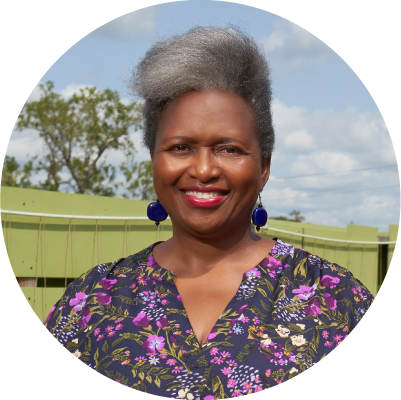No More Empty Pots—Healthy Food For All
By Mary Lee Harvey Dircks
Photo by Ron Coleman, C4 Photography
When Nancy Williams moved to a north Omaha neighborhood in the late 1990s, she noticed a few things that were different from her previous neighborhood in Bellevue. “The grocery stores close to us did not have the same quality of food that we could find in the same chains as other places in town.” she says. Williams also noticed that her kids’ friends did not have the same access to fresh food and quality home-cooked meals that her kids did. “With our kids, we were in community gardens, and we were growing our own food at home because I wanted them to have that experience—to know how to grow food and how to eat seasonally and locally because that’s how I grew up.”
This awareness sparked conversations with other community members, and the vision for No More Empty Pots (NMEP) ignited. “I was getting together with folks who were interested in making life better around access to healthy food,” Williams says. “It took from 2010 to 2019 before we could fully realize all that we felt like the community asked for at that time. Our intention was to make a space where you could see all the areas of the food system in action—from production to processing, distribution, consumption and recycling. We have a zero-waste station set up. We have very little to no waste going into the landfill. Everything is reused, recycled or not consumed in the first place.”
Williams worked as Founder and volunteer for NMEP until 2015 when she stepped into the role of President and CEO. She brings decades of experience as well as a Bachelor of Science degree in Horticultural Science and a Master of Science degree in Weed Science and Plant Pathology. “It’s a much more systemic issue than just having access to a community garden or access to a farmer’s market or growing your own food. All of those things contribute to a healthier community and healthier people, which leads to kids doing better in school and reaching their full potential,” Williams says. “Nutrition also supports adults and seniors to be healthy enough to work consistently and to age well.”
Those early conversations identified gaps, needs and issues to be addressed, as well as resources and assets, Williams recalls. They defined their mission to connect individuals and groups to improve self-sufficiency, regional food security and the economic resilience of urban and rural communities through advocacy and action, as well committing to three core values: education, stewardship and sustainability.
“Over those first three years we identified that a food hub was the best way to support urban agriculture and to provide a kitchen that entrepreneurs could rent by the hour.”
In 2014 NMEP purchased three 100-year-old buildings in the Florence neighborhood of North Omaha. One building served as the administrative office. Plans were set into motion for renovation on the other two buildings that would later become the Food Hub. The shared-use kitchen opened for entrepreneurs to rent space in 2017, and by 2019 construction of the Food Hub reached completion to serve more than 400 youth in June and July. That same summer, a full-service café with meeting space and WiFi—Cups Café at Florence—also opened.
The NMEP Food Hub is exactly that, the effective center of education, support and access to healthy food serving all ages, from kids to senior adults. Highlights include scratch-made meals using fresh ingredients from local farmers and boxes of fresh local produce, but there is also community education, micro enterprise development, workforce training and entrepreneur programing and support.
“Small business and entrepreneurship are the backbone of economic development,” Williams says. About 95 percent of businesses fail in the first five years. “To have six figures of debt to go along with that is unpalatable,” Williams says. “The shared-kitchen space serves as an incubator for entrepreneurs to figure out what works without having as much risk associated with it.” NMEP also provides support and guidance to improve the likelihood that individuals will succeed.
When the pandemic hit, NMEP closed its doors to the public and scaled up its efforts with the Community Harvest program, which offers prepared meals to individuals, as well as boxes of fresh local produce through the Community Supported Agriculture program. They switched over to the no-cost option, which is for emergency food relief called Feeding Our Neighbors, and utilized more than 40 local farmers. A combination of grants and individual donations, ranging from $1 to $50,000, supported that work, enabling NEMP and cooperating community partners to provide 51,000 meals in 48 different zip codes.
“In that response we could see what the impact would be if we did something like this consistently,” Williams says. Supporting local farmers allows for recirculation of those dollars into the communities where they live, all while ensuring that healthy food is available to people who need it. “We got the chance to witness a lot of full circle moments and comprehensive ways that programs like this could affect multiple stakeholders in the community.”
“Nutrition and access to healthy food was one way that I saw we could help make a positive impact in the community and on the people,” Williams says. “If we have self-sufficiency of people and the resilience that can come from the economics of a very much resourced and engaged local food system, then everybody is working together for a common good and we all get to benefit from it.”

